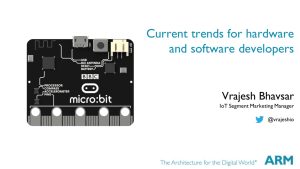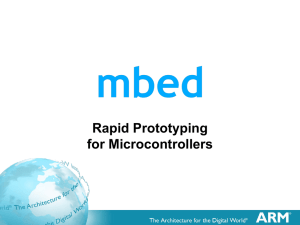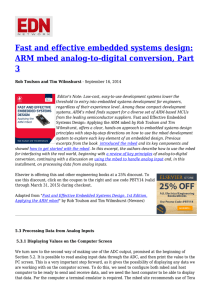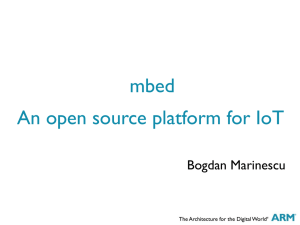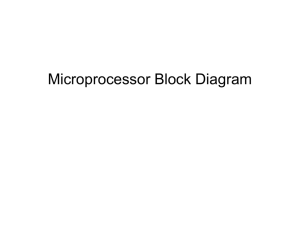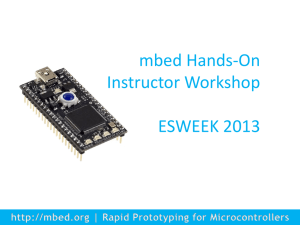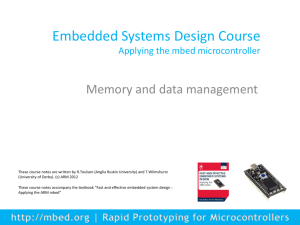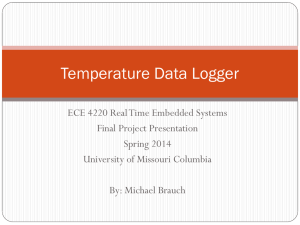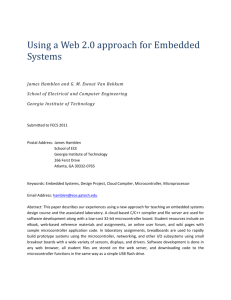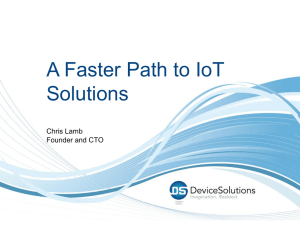Keynote Presentation template
advertisement
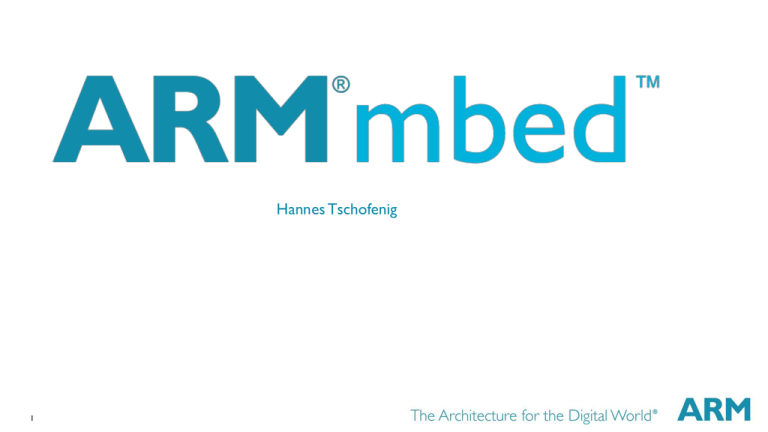
Hannes Tschofenig 1 The Internet of Things Today Enormous potential “Tens of billions of new devices” … but market growing slower than expected Embedded, but different IoT devices are often “embedded” but can have different requirements, constraints and goals compared to conventional embedded systems Often very strict energy or resource constraints Complexity rapidly increasing Security, manageability, updates often underestimated More sophisticated hardware requires more software … and vice versa! 2 Challenges Embedded development is a specialized skill The tens of millions of non-embedded developers struggle with the low-level environment, lack of libraries and strict resource constraints Conversely, embedded developers struggle with internet protocols, servers, security, networking, etc Even with good embedded developers, embedded software is expensive, slow to market, and getting worse! Power management is important, but difficult Allowing the programmer to manually manage power requires they deeply understand the hardware Hardware often consumes energy in non-obvious ways Most software is not re-used Less than 25% of embedded projects use third-party software components [Source: UBM Embedded Market Study 2013] Software re-use lowers costs, time-to-market, and fosters protocol interoperability and security Connectivity introduces many new security concerns Previously isolated devices now at risk of remote attack, data leaks, and denial of service Security is also a specialized skill; non-experts often introduce subtle vulnerabilities 3 Smart Cities Smart Home Wearables Application Application Application Sub-GHz Zigbee IP-NAN Implementations of key connectivity standards BT Smart Thread Connectivity Connectivity Provisioning Security OS + Drivers Provisioning Security OS + Drivers Common OS foundation 4 BT Smart BT Smart IP Connectivity Provisioning Security OS + Drivers OS Productivity 5 Security Connectivity Management Efficiency mbed OS Minimize time-to-market Low-power by design Complete security solution Top connectivity standards Built-in device management 6 Application Framework ARM® Cortex®-M Product Line Low power implementation Sleep mode support Wake-up Interrupt Controller Broad tools and OS support Binary compatible roadmap Performance efficiency Feature rich connectivity Lowest power Outstanding energy efficiency Digital Signal Control (DSC) Processor with DSP Accelerated SIMD Floating point (FP) 32-bit RISC architecture High efficiency processor cores Integrated Interrupt Controller Thumb® support Lowest cost Low power 7 Cortex-M7 has been released recently: http://www.arm.com/products/processors/cortex-m/cortex-m7-processor.php In the ‘90s the processor used to be the scarce resource In IoT there are different scarce resources: Energy & Productivity 8 ARM mbed OS Philosophy Reducing total system cost by enabling better system tradeoffs = Total Cost + + Hardware Cost Energy Cost Devel. Cost (amortized, inc. deployment cost) We care about this. But it can make sense to spend more here … (e.g. on more memory) 9 … if it results in savings here … (e.g. sophisticated power management) … and here. (e.g. firmware update, manageability) ARM mbed OS Philosophy Increase developer productivity and reduce development costs Use higher-level languages that allow the developer to express their intention more succinctly and concisely, with less chance of mistakes mbed utilizes C++ for ease of development Better tools Automated testing infrastructure Improved debug and diagnostics support Increase software reuse Online community for sharing components Automate the process of incorporating software components into a project Commonly used functionality bundled into the OS Consistent power management 10 ARM mbed OS Supports Key Standards for Growth and Scale Provisioning, Management & Semantics Internet Security & Protocols Connectivity 11 11 The I in IoT: Web (and IP) Protocols to the Edge IoT Application Application Device Management Binary | JSON – IPSO Objects REST APIs Web Transport Internet Protocol Connectivity 12 CoAP | HTTP DTLS | TLS UDP | TCP IPv4 | IPv6 | 6LoWPAN Architectural Details Security The security subsystem in mbed OS is called CryptoBox Turns complex security functions into simple, portable and safe API’s Stops people from reinventing wheels by providing modular building blocks for 14 Secure Identity Firmware over the Air Encryption/Decryption and Signing Randomness Secure Manufacturing Application Framework Mbed: Great Momentum 70,000+ developers 9,000+ projects 1M+ builds/year 15 8+ years of IoT products 5+ years 24/7 30+ official mbed boards mbed Device Server mbed Ecosystem • • • • Partners Developers Enabled Services Enabled Products • Freemium model to enable startups • Application data and device management • Growth market access for cloud platforms and operators mbed OS • Free for use on ARM architecture • Leading connectivity standards • Productivity, minimized costs • Built-in management • Security 16 ARM Cortex®-M -based MCU The new mbed Partner Ecosystem: Join Us! Cloud Partners Partners Silicon Partners 17 mbed Device Server mbed OS IoT Service or App IP and Web to the edge End-to-End Security, Web, Data Objects & Management Little Data 18 BIG DATA
